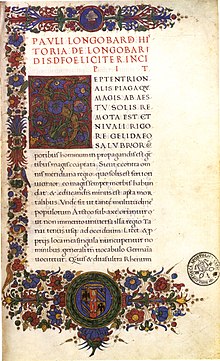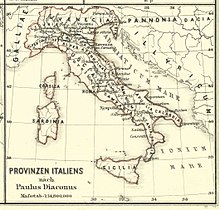Paul Deacon
Paulus Deacon or Paul Warnefried (* between 725 and 730 in Friuli ; † April 13 or July 21, probably before 800 in Monte Cassino ) was a Longobard historian and monk.
resume
As the son of Theodolinda and Warnefried, he came from a noble family who came to Italy with King Alboin and maintained good relations with the court of the Duke of Friuli . Paul enjoyed an excellent education at the court of the Lombard king Ratchis zu Pavia , among others with the grammarian Flavianus . He also received lessons in law, but soon turned to theological studies. It is unknown whether he was still at the royal court among Ratchi's successors. Above all, it is unclear when he entered the Montecassino monastery , where he was very productive (at least before 774).
For Duke Arichis II. And his wife, the Lombard princess Adelperga , he wrote a Roman History ( Historia Romana ) in 16 books until the time Emperor Justinian I gave and the Breviarium of Eutropius continued. In 782 he went to the court of Charlemagne in Aachen to obtain the release of his brother Arechis, who had been involved in an uprising. Charlemagne granted him his request on the condition that Paul himself stayed at the Carolingian court and continued his teaching there. At the court of Charles he achieved great merits through his research and studies. Among other things, he taught Greek, published a collection of homilies ( Omillarius , often printed from 1482 to 1569 and also translated into German) and wrote the Gesta episcoporum Mettensium , a work with a strong Carolingian color. After returning to Monte Cassino in the Duchy of Benevento in 787 , he was still in contact with the Karolingerhof and was still very active in literary terms. Here he also processed the historical work he had started earlier into a history of his people with consideration of Roman and Frankish history under the title Historia gentis Langobardorum .

This unfinished six-volume history book deals with the history of the Lombards from 568, when the tribal association invaded Italy as part of the last migration of the peoples , to the death of King Luitprand in 744. The events are presented from the Lombard perspective and represent the most important source for them History. There are also interesting insights into the relationship between Franks and Lombards. Even if its portrayal is quite subjective and often appears pathetic (which in itself is hardly exceptional), the work is characterized by a relatively critical attitude towards some of the stories at the time of its creation - the legend Origo Gentis Langobardorum , for example, comes off badly away (cf. also Origo gentis ). Paul, who in many points was still connected to the traditions of late antiquity , relies on his own experience and, among other things, on the Origo gentis Langobardorum, which was written down in the 7th century according to oral tradition . Paul also used the Liber pontificalis and (as an important main source) the lost story of the Secundus of Trent ; he also resorted to Beda Venerabilis , Gregory of Tours and Isidore of Seville . Why the work 744 breaks off is disputed in research (as well as what role his stay in the Duchy of Benevento played in the writing of the work). It is possible that death prevented Paul from continuing. The fact that the Historia Langobardorum enjoyed a high reputation in its time is shown not least by the more than one hundred surviving copies . It was widely used by later historians until the 15th century.
Around 770 to 780 Paul wrote a biography of Pope Gregory the Great , which Johannes Hymmonides used in the creation of his own, more extensive Vita Gregorii.
There are also a number of poems, tombstones and letters by Paul and some practical theological writings, including an explanation of the Benedictine rule . He is also the author of the John's hymn , which was used to name the pitches with ut, re, mi, fa, sol, la and si . In addition, an excerpt ( epitome ) from De Verborum Significatu by Sextus Pompeius Festus goes back to him , which is of great importance as a source, since this extensive ancient dictionary is otherwise only passed down in fragments.
A memorial plaque for him is in the Walhalla in Donaustauf . The exact time of his death is not known. He died on April 13 or July 21 of an unnamed year, as suggested by the necrologists of his monastery. The most frequently mentioned year 799 goes back to the fact that there is no trace of Charles' coronation as emperor at Christmas 800 in his works.
Editions and translations
- Pauli historia Langobardorum . In: Ludwig Bethmann, Georg Waitz (eds.): Scriptores rerum Langobardicarum et Italicarum saec. VI-IX. Hanover 1878, pp. 12–219 ( Monumenta Germaniae Historica , digitized version )
- Paul Deacon. Historia Langobardorum (History of the Longobards) . Latin and German. Ed. And transl. by Wolfgang F. Schwarz. Darmstadt 2009.
- Epistolae . Edited by Ernst Dümmler . In: Epistolae (in quart) 4: Epistolae Karolini aevi (II). Published by Ernst Dümmler u. a. Berlin 1895, pp. 505-516 ( Monumenta Germaniae Historica , digitized version )
- Karl Neff: The poems of Paulus Deacon. Critical and explanatory edition (sources and studies on the Latin philology of the Middle Ages, edited by Ludwig Traube , III / 4). Munich 1908.
- Hartmann Grisar : The Gregorbiographie of Paulus Deaconus in its original form, after Italian manuscripts. In: Journal for Catholic Theology 11 (1887), pp. 162–172.
- Pauli Warnefridi. Liber de episcopis Mettensibus. Latin. Edited by Georg Heinrich Pertz in: MGH Scriptorum tomus II, pp. 260–270, Hanover 1829. ( archive.org , digitized )
- Paul Warnefried's Deacon from Forum-Julii History of the Lombards. Translated for the first time from a codex of the royal library in Bamberg from the 10th century and annotated by K. v. Spenner kb Lieutenant , Hamburg 1838. ( digitized version )
literature
- Felix Dahn : Paulus Deacon . In: Allgemeine Deutsche Biographie (ADB). Volume 25, Duncker & Humblot, Leipzig 1887, pp. 245-248. [outdated state of research]
- Adriaan Breukelaar: Paulus Deacon . In: Biographisch-Bibliographisches Kirchenlexikon (BBKL). Volume 7, Bautz, Herzberg 1994, ISBN 3-88309-048-4 , Sp. 60-63.
- Hubertus Seibert : Paulus Deacon. In: New German Biography (NDB). Volume 20, Duncker & Humblot, Berlin 2001, ISBN 3-428-00201-6 , pp. 131-133 ( digitized version ).
- Walter A. Goffart : The Narrators of Barbarian History. Princeton University Press, Princeton 1988, ISBN 0-691-05514-9 .
- Alheydis Plassmann : Origo gentis. Establishing identity and legitimacy in early and high medieval origin narratives (= Orbis mediaevalis. 7). Akademie-Verlag, Berlin 2006, ISBN 3-05-004260-5 , pp. 191–242.
- Alheydis Plassmann: Medieval origines gentium. Paul Deacon as an example. In: Sources and research from Italian archives and libraries 87, 2007, pp. 1–35 ( online ).
- Walter Pohl : Paulus Diaconus and the "Historia Langobardorum": Text and tradition. In: Anton Scharer , Georg Scheibelreiter (ed.): Historiography in the early Middle Ages (= publications of the Institute for Austrian Historical Research. Vol. 32). Oldenbourg, Vienna 1994, pp. 375-405.
- Helmut Rogan: Paulus Diaconus - laudator temporis acti. King's representation and structure principle of the book closings as an answer to the question about the end of the Historia Langobardorum intended by Paul (= dissertations of the Karl-Franzens-Universität Graz. Vol. 91). dbv-Verlag for the Technical University of Graz, Graz 1993, ISBN 3-7041-9051-9 (also: Graz, University, dissertation, 1992).
Web links
- Paulus Deacon in the repertory "Historical Sources of the German Middle Ages"
- Literature by and about Paulus Diaconus in the catalog of the German National Library
- Works by and about Paulus Diaconus in the German Digital Library
- Works (Latin)
- Paulus Diaconus: History of the Langobards (English)
- Original Latin text from the Historia Langobardorum
Remarks
- ^ Hubertus Seibert: Paulus Diaconus. In: New German Biography (NDB). Volume 20, Duncker & Humblot, Berlin 2001, ISBN 3-428-00201-6 , pp. 131-133 ( digitized version ).
| personal data | |
|---|---|
| SURNAME | Paul Deacon |
| BRIEF DESCRIPTION | Longobard monk and historian |
| DATE OF BIRTH | between 725 and 730 |
| PLACE OF BIRTH | Friuli , Italy |
| DATE OF DEATH | between 797 and 799 |
| Place of death | Monte Cassino , Italy |
